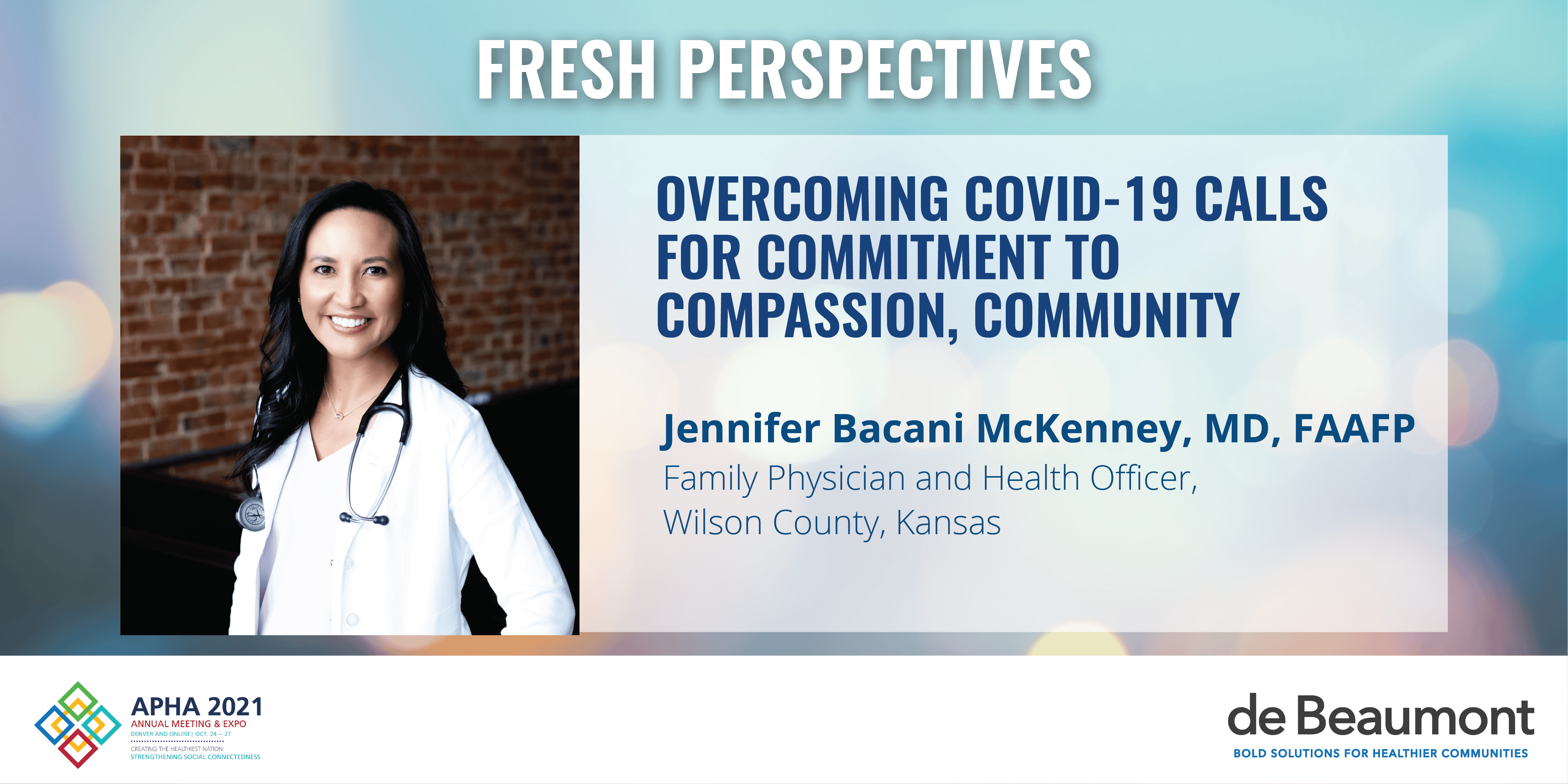This article launches the 2021 Fresh Perspectives series, presented by the de Beaumont Foundation. Published in the weeks leading up to APHA’s 2021 Annual Meeting and Expo in October, the series showcases viewpoints from a range of public health professionals.
Today’s guest author is family physician Jennifer Bacani McKenney, MD, FAAFP, Wilson County health officer in Fredonia, Kansas. McKenney is associate dean for rural medical education at the University of Kansas School of Medicine and is founder of the Remote Scribe Company. She serves on the local school board and the Kansas Health Foundation Board as well as president of the Kansas Academy of Family Physicians.
As we weather the second year of the COVID-19 pandemic, encouraging new scientific innovations are helping us fight COVID-19. Unfortunately, we have had a disheartening surge in cases and hospitalizations in recent weeks. Now, more than ever, what we need is a cooperative effort that uses medical and public health tools we know will work to help us defeat this virus.
Working as a family doctor in my rural hometown of Fredonia, Kansas, has made this experience all-the-more personal. My parents moved here 42 years ago when my father joined the community as a general surgeon. He and my mother have poured their hearts into serving this community every day since they immigrated from the Philippines.
Serving alongside my father for more than a decade, I have worked to gain trust, empower my patients to promote their own health and treat a range of health concerns. For most of these years, the relationship between residents and the health care community has been one of mutual respect and trust.
Sadly, that trust has not necessarily extended to guidance for our strongest defenses against the pandemic. We had resistance to masking and physical distancing early on, and we now have vocal opposition to COVID-19 vaccination. In my role as the Wilson County health officer, I’ve faced mistrust during the pandemic, and I’ve dealt with harassment and anger simply for trying to protect those in our community through public health recommendations.
These past 18 months have been a lesson in compassion. Despite the hardships, my commitment to my community is as strong as ever. These are the people I have a responsibility to serve as a health care provider and public health professional. I will continue doing everything in my power to protect their health and well-being. These are my friends, family and neighbors I have known throughout my life growing up here. These are my people.
My colleagues and I have been steadfast in educating people about COVID-19 mitigation and vaccines. I listen to my patients’ questions and concerns without judgment. I talk to them about my own experience of getting vaccinated and how anxious I am for my children to receive their shots when the time comes. I share evidence that the vaccines are safe and effective, and how billions of people all over the world who have been vaccinated are living proof of the science.
To witness a person shift from fear to enthusiasm about doing something to protect themselves and others is elating. Each person who comes into my office for a routine visit and leaves with a COVID-19 vaccine is a success worth celebrating.
It’s not just health professionals who can make the case for vaccination. Connections can be made virtually anywhere, even the checkout line at the grocery store. A brief conversation could be the impetus for a shift from illness to health.
We have no choice but to keep trying. Outsiders might dismiss those who have ignored public health guidance, wondering, “Why bother with people who don’t care?” But it’s not that simple. COVID-19 knows no boundaries, which means fighting for my community means fighting for yours too. If we can’t reduce infection rates where I live, patients will be sent to hospital beds where you live, threatening progress.
I understand that compassion may not come easy for those who have worked for months and months to lift us out of the pandemic. Just know that if I can find the strength to put the bigger picture of community health over current frustrations and angry voices, anyone can.
As the pandemic has made clear, our own health is not ensured when it is wrapped up in the health of others. That’s why we take care of everyone — vaccinated and unvaccinated. We are all in this together, and we must collectively care for each other.
Small-town, rural values defined my time in Fredonia and made me want to return 12 years ago. Politicization and misinformation have divided us, when COVID-19 is the real enemy. Communities throughout the U.S. have been infected in more ways than one throughout the pandemic, and we must battle together with persistence and compassion.
When times are especially tough, I look at my office walls plastered with uplifting notes and cards sent from people all over the country who have heard our stories of public health challenges and front-line medical care. I’ll see a picture colored by a child who lives 1,000 miles away, and I’m reminded that our efforts in the interest of public health make a difference. Every step of this fight will be worth it in the end. We will weather this crisis and be stronger for the future.
This blog post was first published on APHA’s Public Health Newswire.





